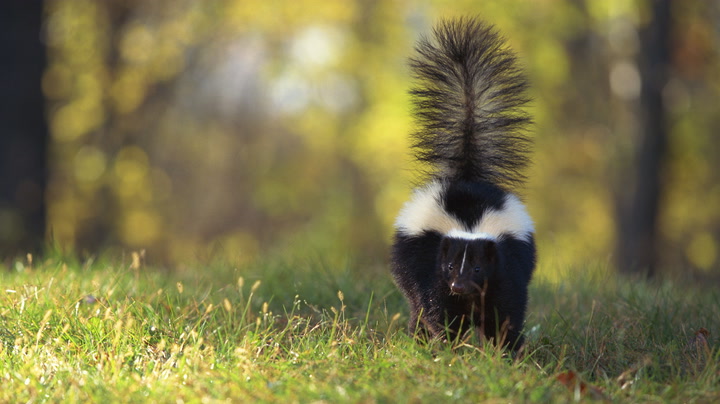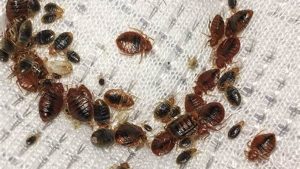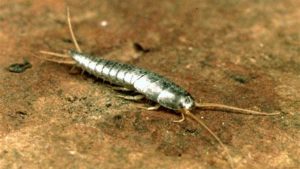Skunks are fascinating creatures with their bold black and white stripes and bushy tails. They are easily recognizable but often more infamous for their potent odor. In the United States, five skunk species exist, with the Striped Skunk (Mephitis mephitis) being the most common. Skunks are nocturnal, spending their days in burrows or under structures and emerging at night to forage for food.
Identifying Skunk Presence

If you suspect a skunk is nearby, look for telltale signs like small, cone-shaped holes in your lawn, which they dig while searching for grubs. You might also notice skunk tracks, which show five toes with visible claws, or even skunk droppings that resemble those of cats but contain undigested food like insect parts. And, of course, the unmistakable skunk odor is a dead giveaway.
Preventive Measures
To keep skunks away, start by removing anything that might attract them. Secure your trash cans with tight-fitting lids, and avoid leaving pet food outside overnight. Clean up any fallen fruits or nuts from your yard. Additionally, seal any potential entry points under your house, deck, or shed with wire mesh or other materials to prevent skunks from making a den.
Deterrent Methods
Skunks dislike bright lights and loud noises. Installing motion-activated lights or sprinklers can scare them away. You can also use scent repellents like ammonia-soaked rags or commercial products designed to deter skunks. These strong smells can make your yard less inviting to these nocturnal visitors.
Humane Eviction Techniques
If a skunk has already taken up residence, you can gently encourage it to leave by using mild harassment techniques. For instance, placing bright lights and playing loud music near the den can make the area uncomfortable for the skunk. If these methods don’t work, consider calling a professional wildlife pest control operator to safely remove the skunk.
Long-term Solutions
To keep skunks from returning, modify their habitat. Regularly clean up debris and control rodent populations, as skunks are attracted to areas with abundant food sources. Using insecticides to control grub populations in your lawn can also help, as skunks often dig for these insects.
Conclusion
Skunks can be a nuisance, but with the right preventive measures and humane eviction techniques, you can keep them at bay. Remember, it’s important to address the root causes that attract skunks to your property to prevent future problems. By securing your home and yard, you can enjoy a skunk-free environment.
Key Information
| Category | Details |
|---|---|
| Species | – 12 species total – 10 species in Western Hemisphere – 4 genera: Mephitis, Conepatus, Spilogale, and Mydaus |
| Common Types | – Striped skunk (Mephitis mephitis) – Spotted skunk (Spilogale spp.) – Hog-nosed skunk (Conepatus spp.) – Hooded skunk (Mephitis macroura) |
| Size | – Length: 8-19 inches (body), 5-15 inches (tail) – Weight: 7 ounces to 14 pounds – Largest: Eastern hog-nosed skunk (27.56-31.50 inches, 4.41-9.91 lbs) |
| Lifespan | – Wild: 2-4 years (average), up to 7 years – Captivity: Not specified |
| Habitat | – Found in: USA, Canada, Mexico, South America – Environments: Forest edges, woodlands, grasslands, deserts |
| Diet | Omnivorous: insects, grubs, small mammals, birds, eggs, fruits, nuts |
| Behavior | – Nocturnal – Solitary, except during mating season – Some species can climb trees |
| Spray Characteristics | – Range: Up to 10-12 feet – Composition: Sulfur compounds (thiols and thioacetates) – Replenishment time: 10-12 days |
| Defense Mechanisms | – Stamping feet – Raising tail – Growling – Handstands (spotted skunks) |
| Population Density | – 1 skunk per 10 acres in ideal environments – 13.5 skunks per square mile of farmland |
| Conservation Status | – Most species: Least Concern – Pygmy spotted skunk: Vulnerable |
Additional Resources
For more information on skunk control and professional help, consider reaching out to local wildlife control services. They can provide additional guidance and support to ensure your property remains skunk-free.
Frequently Asked Questions About Skunks
What are the common types of skunks in North America?
In North America, you can find four main types of skunks:
- Striped skunk (Mephitis mephitis)
- Eastern spotted skunk (Spilogale putorius)
- Hooded skunk (Mephitis macroura)
- Hog-nosed skunk (Conepatus leuconotus)
How can I identify if skunks are living on my property?
Signs of skunk presence include:
- Small, cone-shaped holes in the lawn (3-4 inches in diameter)
- Skunk tracks with five toes and visible claws
- A strong, foul odor
- Damaged trash cans and raided poultry houses
What should I do if I get sprayed by a skunk?
The traditional remedy of a tomato juice bath is not very effective. Instead, use a mixture of hydrogen peroxide, baking soda, and dish soap to neutralize the odor. Avoid getting the mixture in your eyes.
How far can a skunk spray and how often can they do it?
Skunks can spray up to 10-15 feet with accuracy. They can spray multiple times, but it takes about 10-12 days for their glands to replenish the spray.
What do skunks eat?
Skunks are omnivores. Their diet includes insects, grubs, small mammals, birds, eggs, fruits, and nuts. They are opportunistic feeders and their diet can change with the seasons.
Are skunks dangerous to humans or pets?
Skunks are generally not aggressive and will only spray when threatened. However, they can carry diseases such as rabies, which can be transmitted through bites.
How can I humanely remove skunks from my property?
To humanely remove skunks:
- Use mild harassment techniques like bright lights and loud noises.
- Seal entry points to prevent them from returning.
- If necessary, contact professional wildlife control services for safe removal
- .
Do skunks hibernate?
Skunks do not hibernate, but they become less active during the coldest months. They may gather in communal dens for warmth during winter.
How long do skunks live?
In the wild, skunks typically live 2-4 years. In captivity, they can live longer, but specific data is not provided.
How can I prevent skunks from coming onto my property?
To deter skunks:
- Secure trash cans with tight-fitting lids.
- Remove pet food and fallen fruits from your yard.
- Seal any potential entry points under your house, deck, or shed with wire mesh or other materials
- .
What should I do if I find a skunk den under my house or deck?
If you find a skunk den:
- Use mild harassment techniques to encourage the skunks to leave.
- Once they are gone, seal all entry points to prevent them from returning.
- Consider professional help if the skunks do not leave on their own
- .
Are skunks beneficial in any way?
Yes, skunks help control insect and rodent populations, making them beneficial for pest control. They eat a variety of insects and small animals that can be harmful to gardens and crops.By understanding these common questions about skunks, you can better manage and coexist with these interesting creatures while ensuring your property remains skunk-free.


